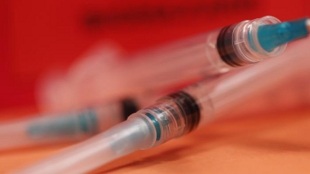Proteins from intestinal microbes can enhance the effectiveness of the seasonal flu vaccine, according to a mouse study. While the vaccine protects against a viral infection, these bacterial triggers stimulate the murine immune system to form protective antibodies more effectively. The results, published today (September 11) in Immunity, further highlight the far-reaching effects of intestinal microbes on host immunity.
“To our knowledge, no one had demonstrated a requirement for microbiota in immunity to vaccination in this way before,” said lead author Bali Pulendran of Emory University in Atlanta.
The effects Pulendran’s team found appeared to be mediated by Toll-like receptor 5 (TLR5), a molecule that mediates an immune reaction to flagellin, the protein which forms filamentous bacterial flagella. Unlike the adaptive response to the specific components of a vaccine, TLR5 is part of the body’s innate immune repertoire, which reacts to microbial molecules common to many species of bacteria. Because it activates TLR5, flagellin is known to act as an adjuvant, boosting reactions to other antigens.
The new results hint at a previously unknown natural adjuvant effect of the microbiome, explained immunologist Patrick Wilson of the University of Chicago who was not involved with the study. “It’s a surprise that the gut microbiota, and TLR5 in particular, can modulate the immune response to influenza and unrelated pathogens,” he said.
The first signs that TLR5 might regulate influenza vaccine responses emerged from a 2011 Nature Immunology study, in which Pulendran and his colleagues used a systems biology approach to observe how the immune systems of healthy adults reacted to the flu shot. The researchers found that TLR5 levels within three days of receiving the vaccine were strongly correlated to the strength of the antibody response against the virus. Why a protein that controls immune reactions to bacteria might influence antibodies against a viral vaccine was unclear; it was this question that led the researchers to perform further tests.
For the present study, Pulendran’s team inoculated a variety of mouse strains with trivalent inactivated influenza vaccine (TIV), one of two commonly used versions of the seasonal flu shot used on people. The researchers found that knockout mice lacking the TLR5 protein had significantly lower levels of antibodies after receiving the vaccine than wild-type mice. Because TIV does not interact directly with TLR5, the authors turned to the microbiome in search of clues to how the vaccine was affecting the innate immune system.
Experiments with germ-free mice and animals treated with antibiotics to deplete their microbes revealed similar responses to TIV: compared to normal mice, both groups of experimental animals showed weaker protective responses to the flu vaccine. Allowing gut microbes to colonize germ-free mice before the animals were inoculated restored a robust antibody response. To ensure that the lack of microbes did not cause inherent defects in immunity, the authors co-injected flagellin with TIV in antibiotic-treated or germ-free mice. They observed the same restorative effect on antibodies in each case.
The results were especially pronounced during the first week after vaccination. Approximately 28 days later, the differences were less pronounced, suggesting that the microbiome’s role is to rapidly trigger initial protective responses. Studying the underlying cellular mechanisms, the group discovered that antibody-secreting B-cells were the primary responders.
The researchers also evaluated how the gut microbiome might affect responses to other vaccines. They found that it seemed to exert similar influence on the polio vaccine’s efficacy, whereas shots containing strong adjuvants—such as the diphtheria-pertussis vaccine—did not appear to be affected by the commensal bacteria. The effects “may be more relevant to inactivated viral vaccines that contain weak or no adjuvants more than others,” said Pulendran.
Understanding how gut microbes might modulate vaccine responses could help improve the efficiency of certain inoculations or inform probiotic supplementation efforts. Although previous studies have examined how Lactobacillus species influence flu vaccine responses, results have been inconsistent, according to Pulendran.
These new data also offer a glimpse of how the innate and adaptive immune responses have co-evolved in the presence of microbes. The results are potentially “paradigm-shifting [in] how they make us think about the interactions between [the two],” said immunologist Bonnie Blomberg of the University of Miami Miller School of Medicine who was not involved with the work.
The microbiome has “a quantitative and qualitative impact on the immune system, and we need to look at both sides of the story,” added Blomberg. “We still don’t know the right mixture of components to generate the ‘best’ immune system.”







